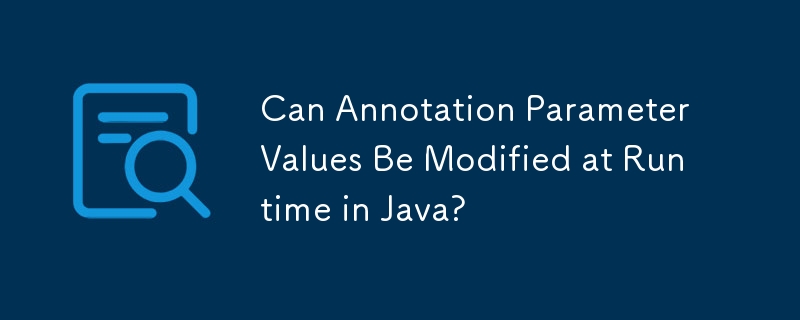

Modify Annotation Parameter Values at Runtime
Imagine encountering a class with an annotation decorated with a specific parameter value, and you wish to alter that value at runtime. Is it feasible to change an annotation parameter value in a compiled class that is already loaded into the JVM?
Solution:
Yes, it is possible to modify annotation parameter values at runtime. The following approach can be employed:
@SuppressWarnings("unchecked")
public static Object changeAnnotationValue(Annotation annotation, String key, Object newValue) {
Object handler = Proxy.getInvocationHandler(annotation);
Field f;
try {
f = handler.getClass().getDeclaredField("memberValues");
} catch (NoSuchFieldException | SecurityException e) {
throw new IllegalStateException(e);
}
f.setAccessible(true);
Map<String, Object> memberValues;
try {
memberValues = (Map<String, Object>) f.get(handler);
} catch (IllegalArgumentException | IllegalAccessException e) {
throw new IllegalStateException(e);
}
Object oldValue = memberValues.get(key);
if (oldValue == null || oldValue.getClass() != newValue.getClass()) {
throw new IllegalArgumentException();
}
memberValues.put(key, newValue);
return oldValue;
}Usage:
@Retention(RetentionPolicy.RUNTIME)
@Target(ElementType.TYPE)
public @interface ClassAnnotation {
String value() default "";
}
@Retention(RetentionPolicy.RUNTIME)
@Target(ElementType.FIELD)
public @interface FieldAnnotation {
String value() default "";
}
@Retention(RetentionPolicy.RUNTIME)
@Target(ElementType.METHOD)
public @interface MethodAnnotation {
String value() default "";
}
@ClassAnnotation("class test")
public static class TestClass {
@FieldAnnotation("field test")
public Object field;
@MethodAnnotation("method test")
public void method() {}
}
public static void main(String[] args) throws Exception {
final ClassAnnotation classAnnotation = TestClass.class.getAnnotation(ClassAnnotation.class);
System.out.println("old ClassAnnotation = " + classAnnotation.value());
changeAnnotationValue(classAnnotation, "value", "another class annotation value");
System.out.println("modified ClassAnnotation = " + classAnnotation.value());
Field field = TestClass.class.getField("field");
final FieldAnnotation fieldAnnotation = field.getAnnotation(FieldAnnotation.class);
System.out.println("old FieldAnnotation = " + fieldAnnotation.value());
changeAnnotationValue(fieldAnnotation, "value", "another field annotation value");
System.out.println("modified FieldAnnotation = " + fieldAnnotation.value());
Method method = TestClass.class.getMethod("method");
final MethodAnnotation methodAnnotation = method.getAnnotation(MethodAnnotation.class);
System.out.println("old MethodAnnotation = " + methodAnnotation.value());
changeAnnotationValue(methodAnnotation, "value", "another method annotation value");
System.out.println("modified MethodAnnotation = " + methodAnnotation.value());
}This approach operates by directly modifying the internal representation of the annotation. As a result, subsequent reflection calls will retrieve the altered parameter value. It has the advantage of not requiring the creation of a new annotation instance, which eliminates the need for prior knowledge of the specific annotation class. Additionally, by leaving the original annotation instance untouched, it minimizes side effects.
The above is the detailed content of Can Annotation Parameter Values Be Modified at Runtime in Java?. For more information, please follow other related articles on the PHP Chinese website!




